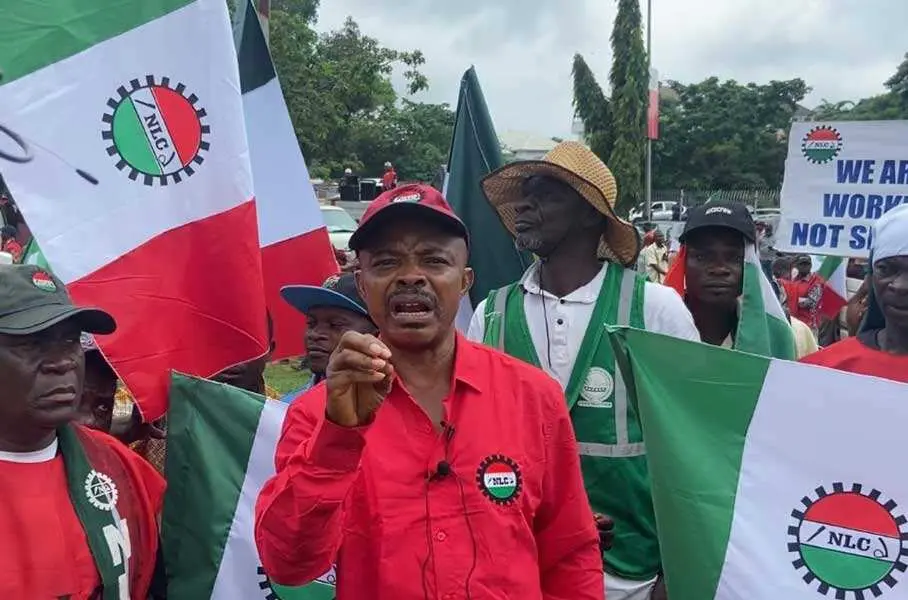The Nigeria Labour Congress (NLC) expressed deep concern on Sunday regarding the severe impact of the ongoing forex crisis on the country’s economy, emphasizing the urgent need for stabilizing the Naira.
In a statement released on Sunday, NLC President Joe Ajaero attributed the depreciation of the national currency to the excessive penchant of government officials for foreign luxury goods. Ajaero cautioned that if the Naira failed to stabilize against the US Dollar, the economy could face a dire wave of consequences.
These remarks from the NLC president precede a scheduled meeting between organized labor representatives and the Federal Government set for today (Monday).
During this meeting, the Federal Government and organized labor will assess the implementation of the Memorandum of Understanding they previously signed concerning subsidy removal measures.
Tale of Two Markets
In the forex arena, the investor and exporter window has maintained relative stability at around N770 to N780 per US dollar. However, the parallel market, which serves as the primary source of forex for most individuals and businesses, has seen the Naira trading at over N1,000 per US dollar.
This depreciation in the parallel market can be attributed to an increasing demand for foreign currency that is not met by the Central Bank of Nigeria’s supply. Consequently, manufacturers are grappling with difficulties in obtaining raw materials, leading to more companies contemplating layoffs or even closure. The devalued Naira has forced manufacturers to reduce production, cut jobs, and limit raw material imports.
NLC’s Stance
In the statement released by the NLC, the labor union squarely blamed politicians for the situation. They called on public officials to cease their affinity for foreign products, as this exacerbates the Naira’s depreciation. President Ajaero reinforced this message during a press conference in Abuja on Sunday.
Ajaero stated, “Hopefully, we may meet tomorrow (today) with the Federal Government to see whether the agreement with organized labor on the fuel subsidy removal palliatives was met or not. If that meeting is to be held, it will be without the Minister of Labour and Employment (Simon Lalong) because we will not be part of any meeting with the Federal Government that the Minister of Labour and Employment will attend.”
The NLC had previously accused Minister Lalong of supporting a faction of the National Union of Road Transport Workers (NURTW), leading them to conduct their own delegates’ conference both regionally and nationally. Due to this allegation, the labor union has lost faith in the Minister’s ability to handle labor relations effectively.
Potential Actions
The NLC recommended various measures that the Federal Government, led by President Bola Tinubu, could take to salvage the Naira. These measures include actively “protecting” the Naira by purchasing locally manufactured goods, such as public vehicles for government officials. Public officials were also urged to prioritize patriotism by refraining from buying foreign products.
The NLC emphasized that Nigeria is fortunate to have local producers meeting international standards in specific sectors, and these brands can meet the needs of certain products for the public service. Thus, the NLC urged public officials to choose these locally manufactured goods over foreign ones to help maintain the Naira’s strength in the foreign exchange market.
Ajaero stressed that every penny spent on foreign-made goods supports jobs outside of Nigeria, putting a strain on the local labor market and the national currency. On the other hand, spending on locally manufactured goods creates employment, elevates income, reduces poverty, and alleviates pressure on the national currency.
The NLC warned that they would take action if the Federal Government does not address the forex crisis urgently. “In the absence of swift and tangible interventions, the Nigeria Labour Congress may find itself compelled to take appropriate steps to compel the relevant authorities to prioritize the rescue of the Naira, the economy, and ultimately, the entire nation,” they cautioned.
Economic Expert’s Insights
Financial expert Mr. Okechukwu Unegbu added his perspective to the issue, suggesting that enhanced local production, increased consumption of domestic products, and reduced imports could contribute to Naira stabilization and strength. He also proposed that the government consider pricing export commodities in Naira.
Labor’s Ongoing Dispute in Imo State
In another development, the labor movement vowed to proceed with its protest in Owerri, the Imo State capital, to address an ongoing dispute with the state government regarding worker layoffs and unpaid salaries. The labor union alleged that more workers had succumbed to hunger in Imo State than to violence from armed assailants.
The NLC expressed deep concern over the persistent violations of workers’ rights and privileges by the Imo State government. The labor leader, Ajaero, warned that labor might make a “political statement” on the maltreatment of workers and could potentially shut down the state on the upcoming governorship election day, November 11, if the state government fails to address the issues.
The grievances listed by Ajaero included outstanding salary arrears, wrongful categorization of workers as ghost workers, the vandalization of the NLC state secretariat, unequal pay practices, non-compliance with the National Minimum Wage, and unresolved gratuity arrears. According to Ajaero, some workers were owed 20 months of unpaid salaries under the unfounded label of being “ghost workers.”
The labor leader emphasized that the government’s failure to implement the N30,000 National Minimum Wage, crucial for workers’ economic well-being, was a significant concern.





